
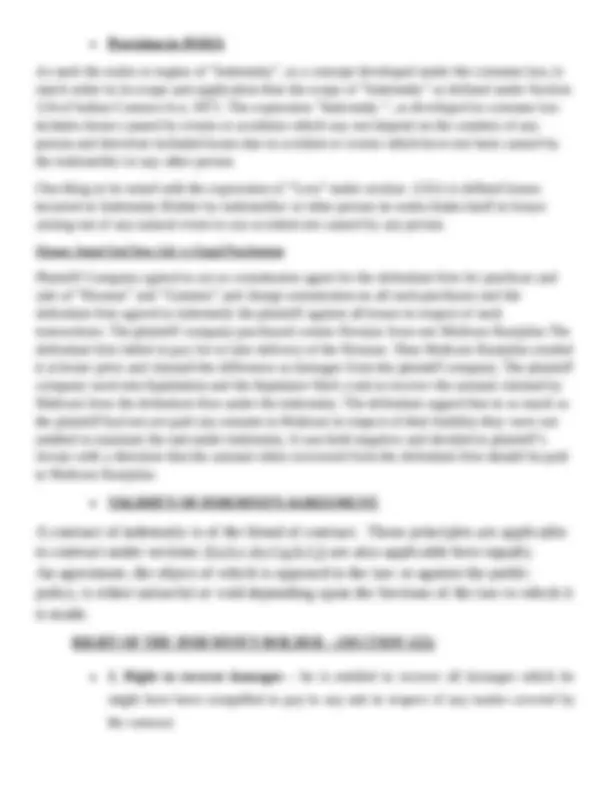
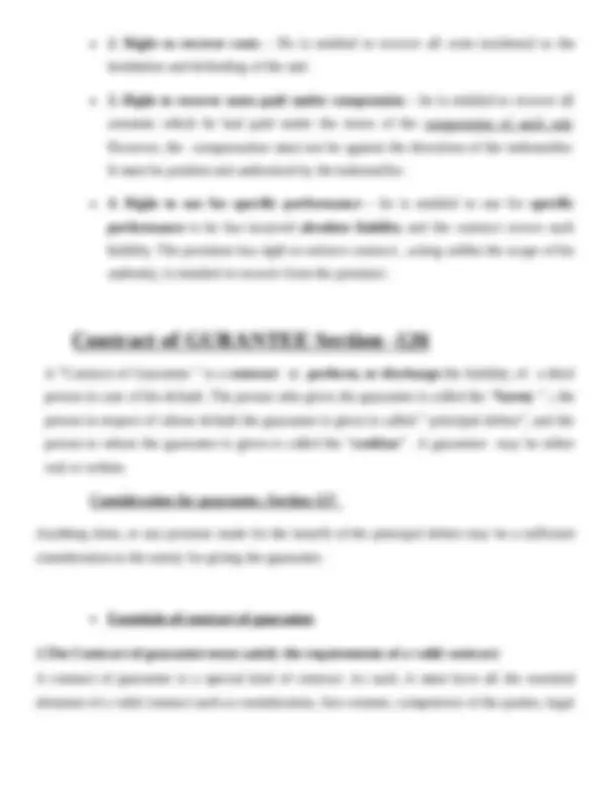
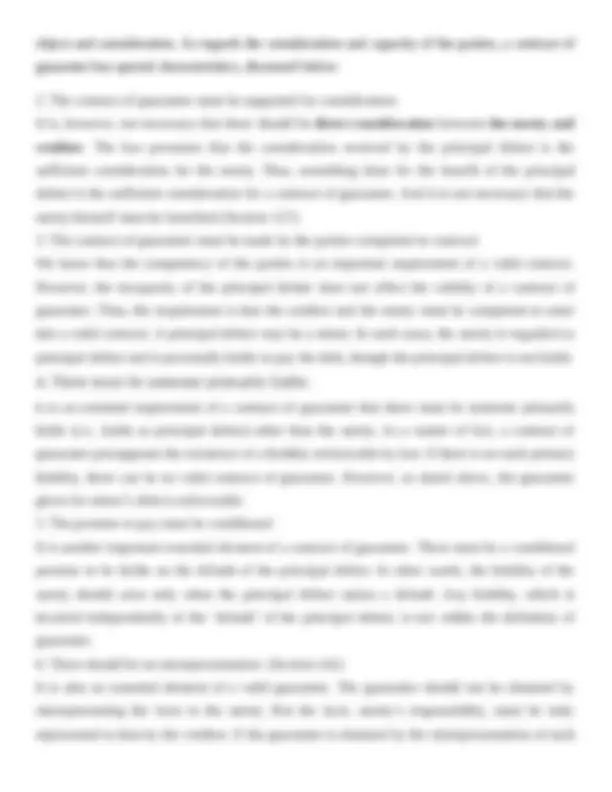
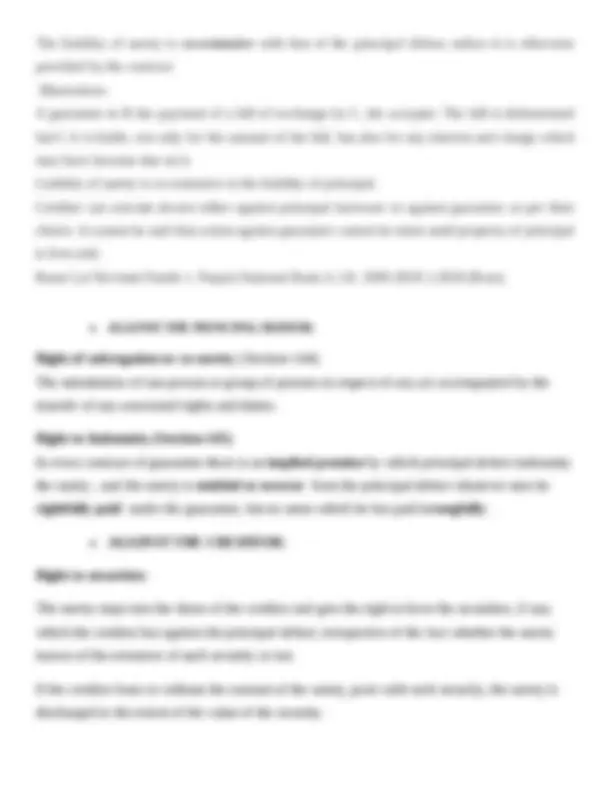
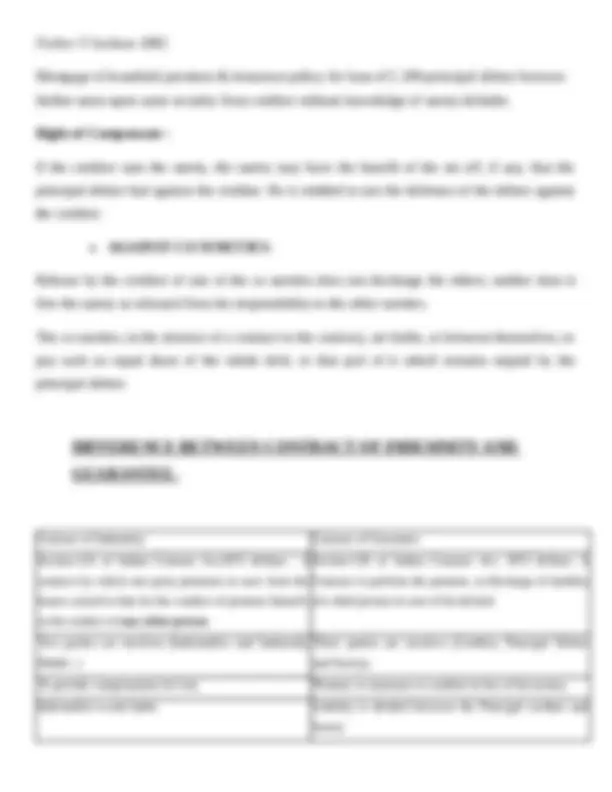



Study with the several resources on Docsity

Earn points by helping other students or get them with a premium plan


Prepare for your exams
Study with the several resources on Docsity

Earn points to download
Earn points by helping other students or get them with a premium plan
Community
Ask the community for help and clear up your study doubts
Discover the best universities in your country according to Docsity users
Free resources
Download our free guides on studying techniques, anxiety management strategies, and thesis advice from Docsity tutors
It defines contract Act,1872 in laconic way.
Typology: Study Guides, Projects, Research
1 / 11

This page cannot be seen from the preview
Don't miss anything!







This project is an effort and research to explore the term “Contract of Indemnity” and “Guarantee” in India.
The term Guarantees and indemnities are a nominal way in which a person aegis themselves from the risk of damages and default. As usual Assets Lenders will often seek a guarantee and indemnity if they have any reasonable doubts about a borrower’s ability to fulfill its legal liability under this agreement. Both Guarantors and indemnities take a financial risk while entering into such transactions, and it is imperative that they are aware of the consequences and implications.
Definition and Nature
“Indemnity ” is not a Widely used expression in daily life expression but it also been defined in “Indian Contract Act,1872”. Under Section- 124 of Indian Contract Act,1872 it is defined as “A contract by which one party promises to save the other from loss caused to him by the conduct of the promise himself , or by the conduct of any other person , is called a “contract of indemnity ” ”.
Indemnity literally meaning defined as “duty to make good any loss, damage incurred by another”, or “right of an injured party to claim reimbursement for its loss ,damage from a person who has such duty. ”
One thing to be noted here that the loss mention in under Section 124, above often used for insurance contracts. But it may be noted here that Life insurance is not a contract of indemnity.
An agreement of indemnity, as a idea developed under common law, is an agreement wherein the promisor , promises to save the promisee from any loss caused by events or misadventure or damage which do not or may not depend on the conduct of any person or from liability from something done by the promisee at the request of the promisor.
The plaintiff an auctioneer, sold certain cattle on the instruction of the defendant. Later, it came to know that the auctioneer sold the cattle did not belong to the defendant, but to another person who had made the auctioneer liable and the auctioneer in turn sued the defendant for the loss he had suffered by the acting on the defendant’s instructions. The court determined that the plaintiff having acted on the request of the defendant was entitled to assume that if, what he did turned be wrongful, he would be indemnified by the defendant.
♦ 2. Right to recover costs – He is entitled to recover all costs incidental to the institution and defending of the suit. ♦ 3. Right to recover sums paid under compromise – he is entitled to recover all amounts which he had paid under the terms of the compromise of such suit. However, the compensation must not be against the directions of the indemnifier. It must be prudent and authorized by the indemnifier. ♦ 4. Right to sue for specific performance – he is entitled to sue for specific performance is he has incurred absolute liability and the contract covers such liability. The promisee has right to enforce contract , acting within the scope of his authority, is entailed to recover from the promiser.
A “Contract of Guarantee ” is a contract to perform, or discharge the liability, of a third person in case of his default. The person who gives the guarantee is called the “ Surety ” ; the person in respect of whose default the guarantee is given is called “ principal debtor”, and the person to whom the guarantee is given is called the “ creditor ”. A guarantee may be either oral or written. Consideration for guarantee.-Section-
Anything done, or any promise made for the benefit of the principal debtor may be a sufficient
consideration to the surety for giving the guarantee.
♦ Essentials of contract of guarantee
1.The Contract of guarantee must satisfy the requirements of a valid contract:
A contract of guarantee is a special kind of contract. As such, it must have all the essential elements of a valid contract such as consideration, free consent, competence of the parties, legal
object and consideration. As regards the consideration and capacity of the parties, a contract of guarantee has special characteristics, discussed below:
it is an essential requirement of a contract of guarantee that there must be someone primarily liable (i.e., liable as principal debtor) other than the surety. As a matter of fact, a contract of guarantee presupposes the existence of a liability enforceable by law. If there is no such primary liability, there can be no valid contract of guarantee. However, as slated above, the guarantee given for minor’s debt is enforceable.
By Variance :(Section-133) Any variance made without the surety’s consent, in the terms of the contract between the principal debtor and the creditor, discharges the surety as to transactions
subsequent to the variance.
By release or discharge of Principal Debtor: (Section-134)^ The Surety is discharged by any contract between creditor and principal debtor, by which the principal debtor is released , or by any act or omission of the creditor, the legal consequences of which is the discharge of the principal debtor.
Illustration : A contracts with B for a fixed price to build a house for B within a stipulated time, B supplying the necessary timber, C guarantees A’s performance of the contract, B omits to supply the timber. C is discharged from the suretyship.
By compromise, Extend of time , or Promise not to sue: (Section-135) A contract between the creditor and the principal debtor, by which the creditor makes a :-Composition or pact with or promises or extends times to, or not to sue, the principal debtor, discharges the surety, unless the surety assents to such contract.
Note: Variance made in prefixed contract of Guarantee without assents or intimation to surety, it promptly discharges the surety from his obligation.
If the above given in Section-135 any of three events take place between the creditor and principal debtor, it leads to “ Novation of contract ” i.e. De novo Contract.
By impairing surety’s remedy: (Section-139)
If the creditor does any act which is inconsistent with the rights of the surety, or omits to do any act which his duty to the surety requires him to do and the eventual remedy of the surety himself against the principal debtor is thereby impaired or diminish, the surety is discharged.
Case: M R Chakrapani Iyengar Vs. Canara Bank(1997)
RIGHTS OF THE SURETY
Surety’s Liability : Section-
The liability of surety is co-extensive with that of the principal debtor, unless it is otherwise provided by the contract. Illustrations: A guarantee to B the payment of a bill of exchange by C, the acceptor. The bill is dishonoured but C.A is liable, not only for the amount of the bill, but also for any interest and charge which may have become due on it. Liability of surety is co-extensive to the liability of principal. Creditor can execute decree either against principal borrower or against guarantor as per their choice. It cannot be said that action against guarantor cannot be taken until property of principal is first sold. Bansi Lal Nirvrutti Pandit v. Punjab National Bank A.I.R. 2009 (NOC) 2818 (Bom).
♦ AGAINST THE PRINCIPAL DEBTOR:
Right of subrogation or co-surety: (Section-144)
The substitution of one person or group of persons in respect of any act accompanied by the transfer of any associated rights and duties.
Right to Indemnity (Section-145) In every contract of guarantee there is an implied promise by which principal debtor indemnity the surety ; and the surety is entitled to recover from the principal debtor whatever sum he rightfully paid under the guarantee, but no sums which he has paid wrongfully.
♦ AGAINST THE CREDITOR:
Right to securities:
The surety steps into the shoes of the creditor and gets the right to have the securities, if any, which the creditor has against the principal debtor, irrespective of the fact whether the surety knows of the existence of such security or not.
If the creditor loses or without the consent of the surety, parts with such security, the surety is discharged to the extent of the value of the security.
Indemnifier is primarily liable for loss Principal debtor is primarily liable. Surety is secondary liable. Liability arouses as soon as loss occurs Indemnifier cannot sue the third party for loss which indemnifier sustain.
Liability is prima facie is fixed Surety has right to recover the amount after debt is discharge from the principal debtor.
CONCLUSION